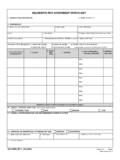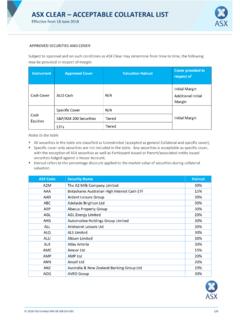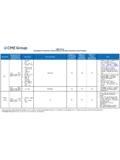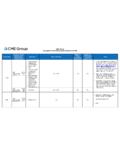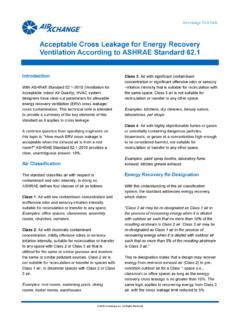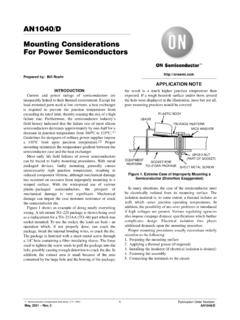Transcription of Army Reserve Acceptable Use Policy (AUP) for …
1 army Reserve Acceptable Use Policy (AUP). for Access to CLASSIFIED / UNCLASSIFIED Systems [The proponent agency is G-2/6.]. SECTION I - Policy . 1. Understanding. By signing this document, you acknowledge and consent that when you access Department of Defense (DoD) information systems: * You are accessing a Government (USG) information system (IS) (which includes any device attached to this information system). that is provided for Government authorized use only. * You consent to the following conditions: a. The Government routinely intercepts and monitors communications on this information system for purposes including, but not limited to, penetration testing, communications security (COMSEC) monitoring, network operations and defense, personnel misconduct (PM), law enforcement (LE), and counterintelligence (CI) investigations. b. At any time, the Government may inspect and seize data stored on this information system.
2 C. Communications using, or data stored on, this information system are not private, are subject to routine monitoring, interception, and search, and may be disclosed or used for any Government-authorized purpose. d. This information system includes security measures ( , authentication and access controls) to protect Government interests--not for your personal benefit or privacy. e. Notwithstanding the above, using an information system does not constitute consent to personnel misconduct, law enforcement, or counterintelligence investigative searching or monitoring of the content of privileged communications or data (including work product). that are related to personal representation or services by attorneys, psychotherapists, or clergy, and their assistants. Under these circumstances, such communications and work product are private and confidential, as further explained below: (1) Nothing in this User Agreement shall be interpreted to limit the user's consent to, or in any other way restrict or affect, any Government actions for purposes of network administration, operation, protection, or defense, or for communications security.
3 This includes all communications and data on an information system, regardless of any applicable privilege or confidentiality. (2) The user consents to interception/capture and seizure of ALL communications and data for any authorized purpose (including personnel misconduct, law enforcement, or counterintelligence investigation). However, consent to interception/capture or seizure of communications and data is not consent to the use of privileged communications or data for personnel misconduct, law enforcement, or counterintelligence investigation against any party and does not negate any applicable privilege or confidentiality that otherwise applies. (3) Whether any particular communication or data qualifies for the protection of a privilege, or is covered by a duty of confidentiality, is determined in accordance with established legal standards and DoD Policy . Users are strongly encouraged to seek personal legal counsel on such matters prior to using an information system if the user intends to rely on the protections of a privilege or confidentiality.
4 (4) Users should take reasonable steps to identify such communications or data that the user asserts are protected by any such privilege or confidentiality. However, the user's identification or assertion of a privilege or confidentiality is not sufficient to create such protection where none exists under established legal standards and DoD Policy . (5) A user's failure to take reasonable steps to identify such communications or data as privileged or confidential does not waive the privilege or confidentiality if such protections otherwise exist under established legal standards and DoD Policy . However, in such cases the Government is authorized to take reasonable actions to identify such communication or data as being subject to a privilege or confidentiality, and such actions do not negate any applicable privilege or confidentiality. (6) These conditions preserve the confidentiality of the communication or data, and the legal protections regarding the use and disclosure of privileged information, and thus such communications and data are private and confidential.
5 Further, the Government shall take all reasonable measures to protect the content of captured/seized privileged communications and data to ensure they are appropriately protected. f. In cases when the user has consented to content searching or monitoring of communications or data for personnel misconduct, law enforcement, or counterintelligence investigative searching, ( , for all communications and data other than privileged communications or data that are related to personal representation or services by attorneys, psychotherapists, or clergy, and their assistants), the Government may, solely at its discretion and in accordance with DoD Policy , elect to apply a privilege or other restriction on the Government's otherwise-authorized use or disclosure of such information. USAR Form 75-R (TEST), 1 Aug 08 Previous edition is obsolete and will not be used. g. All of the above conditions apply regardless of whether the access or use of an information system includes the display of a Notice and Consent Banner ("banner").
6 When a banner is used, the banner functions to remind the user of the conditions that are set forth in this User Agreement, regardless of whether the banner describes these conditions in full detail or provides a summary of such conditions, and regardless of whether the banner expressly references this User Agreement. I understand that I have the responsibility to safeguard the information contained on the army Reserve Network (ARNet), from unauthorized or inadvertent modification, disclosure, destruction, denial of service, and use. I further understand this responsibility extends to any and all Department of Defense information systems (IS) or networks. 2. Access. Access to the SIPRNet, the unclassified ARNet, or any other DOD IS or network, is for official and authorized use as set forth in DOD. , (Joint Ethics Regulation), AR 25-1 ( army Knowledge Management and Information Technology), and AR 25-2 (Information Assurance).
7 3. Revocability. I understand that, lAW AR 380-53, use of any Government owned computer constitutes consent to monitoring for security purposes and to ensure that my use is authorized. I understand that I have no expectation of privacy while using or accessing Government ISs or resources and that access to Government resources is a revocable privilege. I further understand that any information captured during monitoring may be used for administrative or disciplinary actions or for criminal prosecution. 4. Classified Information Processing. a. I understand that the SIPRNET (Secret Internet Protocol Router Network) is the primary classified IS for the army Reserve and that it: (1) is a US-only system approved to process SECRET or lower collateral information; (2) is not authorized to process TOP SECRET or higher information; (3) provides communications to external DoD organizations using the SIPRNet primarily via electronic mail and internal networking protocols such as web and ftp.
8 B. I will not introduce classified information to the NIPRNet or any other network not approved for classified processing. I. understand that the introduction of classified information to an unclassified network is a security violation which will investigated and handled as a security violation or as a criminal offense resulting in possible punitive action. If I introduce or am aware of the introduction of classified information to an unclassified network (known as a spillage) I will immediately report the incident to my Information Assurance Security Officer. c. I will protect my password as SECRET and will not disclose it to anyone, write it down, or transmit it electronically. d. I will not enter, display, or process classified data where visible to unauthorized personnel. e. I will protect all information on the SIPRNet as SECRET. Printed material and removable storage media, such as but not limited to diskettes, hard drives, and CDs, will be conspicuously marked and protected in accordance with AR 380-5, Information Security.
9 F. I will report any changes in my status, such as transfer, change in requirements for need to know , or removal of security access) to my Information Assurance Security Officer. 5. Unclassified Information Processing. The ARNet is the primary unclassified information system for the army Reserve . a. The ARNet provides UNCLASSIFIED communication to external DoD and other US Government organizations. Primarily this is done via electronic mail and Internet network protocols such as but not limited to web, ftp, and telnet. b. The ARNet is approved to process UNCLASSIFIED, SENSITIVE information in accordance with AR 25-2. c. The ARNet and the Internet, as viewed by the army Reserve , are synonymous. E-mail and attachments are vulnerable to interception as they traverse the NIPRNet and Internet. 6. Minimum Security Rules and Requirements. As a Government computer user, the following minimum security rules and requirements apply: a.
10 I will not be permitted access to any Government owned IS unless I am in complete compliance with the personnel security requirements set forth in DOD , AR 380-67 and AR 25-2. b. I have completed the DoD Information Assurance Awareness Training module online at and I will participate in all required training programs directed by AR 25-2. c. I will protect my CAC PIN, passwords, and pass-phrases lAW AR 25-2. Passwords will consist of at least 14 characters with 2 of each of the following: uppercase letters, lowercase letters, numbers, and special characters. Passwords will not consist of common names, User IDs, call signs, birthdays, phone numbers, military acronyms, or dictionary-based words. Accounts that have not been logged in to (inactive) for 60 days will be disabled. The account that has been inactive for 120 days will be deleted. d. I will not reveal my CAC PIN, password, or pass-phrase to anyone nor will I store it on any IS or storage media or keep it in written form.
